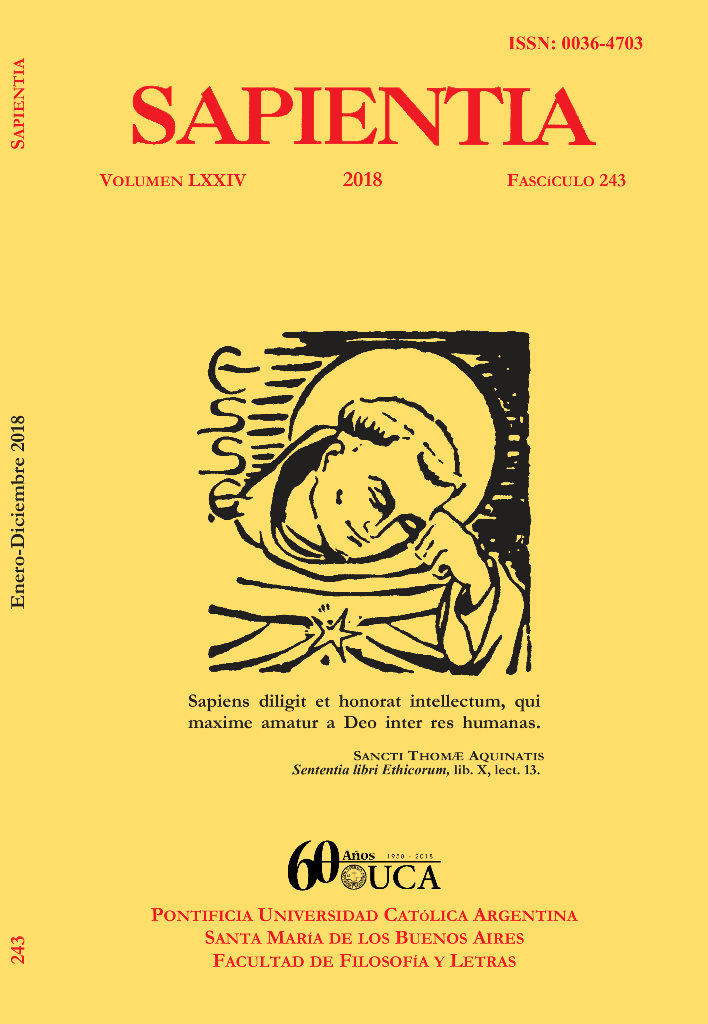Intentionality and Immateriality in Thomas Aquinas
Keywords:
Species — Intentionality — Immateriality — Knowledge — Saint Thomas AquinasAbstract
Several arguments are provided to defend the Thomistic thesis that the essence of knowledge consists in immateriality, against a large sector of contemporary Thomism that prefers to view that the essence of knowledge consists in intentionality. There are two parts to this essay: one historical and the other systematic. The historical part is an attempt to identify the origin of the intentionalist language in contemporary Thomism. It is followed by the systematic part, where it is argued that the Thomistic concept of intentionality not only does not coincide with the modern one, but is relegated to the background in relation to the notion of immateriality. Several reasons are given for this, first, because knowledge by intentionality is simply a type of knowledge, not all knowledge is by intentionality, and, in addition to this, is an imperfect knowledge; second because intentionality is a causal effect; third, because intentionality is not a property of the act of knowledge, but of the form.
Downloads
References
ANSCOMBE, GERTRUDE ELIZABETH M., y GEACH, PETER T., Three Philosophers, Oxford, Basil Blackwell, 1961.
ARISTOTELES, Obra Completa, Madrid, Editorial Gredos, 1984-2004. Especialmente los libros, Sobre el Alma, y Tratados breves de historia natural.
BALTUTA, E., “From Intentionality to Immateriality. The Mark of the Cognitive for Thomas Aquinas”, Transylvania Review, 23, 1, 2014, pp. 62-77.
BLACK, DEBORAH L., «Intentionality in Medieval Arabic Philosophy», Later Medieval Perspectives on Intentionality, en Quaestio 10, 2010.
BRENTANO, FRANZ, Psychologie vom empirischen Standpunkt, Hamburg, Felix Meiner Verlag, 1973.
BROCK, STEPHEN, “Intentional being, natural being, and the first-person perspective in Thomas Aquinas”, The Thomist 77 (2013), 103-133.
DUMMET, MICHAEL, The Origins of Analytic Philosophy, Boston, Harvard University Press, 1996.
EHRENFELS, CHRISTIAN, Über Gestaltqualitäten, en: Vierteljahrsschrift für wissenschaftliche Philosophie, 14, Graz, 1890.
CHISHOLM, RODERICK, Brentano and Meinong Studies, Amsterdam, Editions Rodopi B.V., 1982.
— Perceiving: A Philosophical Study, Ithaca, Cornell University Press, 1957
FABRO, CORNELIO, La Fenomenologia della percezione, Milano, Vita e Pensiero, 1941.
— Percezione e pensiero, Milano, Vita e Pensiero, 1941.
— La svolta antropologica di Karl Rahner, en Opere Complete 25, Roma, Editrice dei Verbo Incarnato, 2011.
GEACH, PETER T., «Form and Existence», Proceedings of the Aristotelian Society, 55, 1954-1955.
HALDANE, JOHN, «Mind-World Identity Theory and the Anti-Realist Challenge», Reality, Representation and Projection, editor J. Haldane y C. Wright, Oxford, Oxford University Press, 1993.
— «Forms of Thought», The Philosophy of Roderick Chisholm, editor Lewis Edwin Hahn, Illinois, Open Court, 1997.
— «Realism with a Metaphysical Skull», Hilary Putnam: Pragmatism and Realism, editor James Conant y Urszula Zeglen, London, Routledge, 2002.
HUSSERL, EDMUND, Ideas: General Introduction to Pure Phenomenology, "Autor's Preface to the English Edition" London 1931.
— Investigaciones Lógicas, volumen 2, Traducción de Manuel García Morente y José Gaos, Madrid, Alianza Editorial, 2006.
IONNIS A SANCTO THOMA, Cursus thelogicus, Parisiis, Desclée et Sociorum, 1934.
JACQUETTE, D., “Brentano’s Concept of Intentionality”, en The Cambridge Companion of Intentionality, al cuidado de Dale Jacquette, New York, Cambridge University Press, 2004.
KENNY, ANTHONY, «Intentionality: Aquinas and Wittgenstein», The Legacy of Wittgnestein, New York, Basil Blackwell, 1984.
— Aquinas on Mind, London, Rutledge, 1993.
KLIMA, GIULA, “Intentional Transfer in Averroes, Indifference of Nature in Avicena, and the Representationalism of Aquinas,” Universal Representation, and the Ontology of Individuation, G. Klima y A. Hall (editores), Newcastle upon Tyne, Cambridge Scholars Publishing, 2011
LISSKA, ANTHONY, Aquinas’s Theory of Perception, An Analytic Reconstruction, Oxford, Oxford University Press, 2016.
MEINONG, ALEXIUS, Über Gegenstandstheorie, en Alexius Meinong Gesamtausgabe, al cuidado de Rudolf Haller, Graz - Austria, Akademische Druck- u. Verlagsanstalt, 1971 volumen 2.
MILLÁN PUELLES, ANTONIO, La Estructura de la Subjetividad, Madrid, Ediciones Rialp, 1967.
MOSER, ROBBIE, «Thomas Aquinas, esse intentionale, and the cognitive as such», The Review of Metaphysics, 64, 2011.
PASNAU, ROBERT, Theories of Cognition, New York, Cambridge University Press, 1997.
PERLER, DOMINIC., Theorien der Intentionalität im Mittelalter, Frankfurt, Klosterman, 2004.
SAN AGUSTÍN, De trinitate libri quindecim, Opera Omnia, Patrologia Latina 42.
SANGUINETI, JUAN JOSE, “La especie cognitiva en Tomás de Aquino”, Topicos, Revista de Filosofía, 40, 2011, pp. 63-103.
SANTO TOMÁS DE AQUINO, Opera Omnia, editado y puesto en versión electrónica por BUSA, ROBERTO, SJ, mantenido por ALARCÓN, ENRIQUE, en la Universidad de Navarra, España. Disponible en http://www.corpusthomisticum.org/iopera.html. Fecha de consulta: 7/15/2018.
SCARPELLI-CORY, THERESE, «Knowing as Being? A Metaphysical Reading of the Identity of Intellect and Intelligibles in Aquinas», American Catholic Philosophical Quarterly, 91, 3, 2017.
SPRUIT, LEEN, Species intelligibilis: From Perception to Knowledge, 2 volúmenes., Leiden, Brill, 1994.
VELARDE--MAYOL, VÍCTOR, On Brentano, New York, Wadsworth, 2000.
__________. Ser y Objeto, Madrid, Síntesis, 2016.
Downloads
Published
How to Cite
Issue
Section
License





 Sapientia
Sapientia